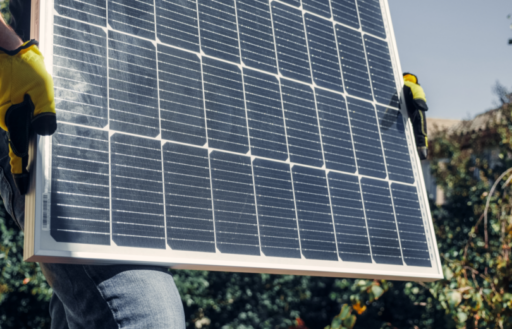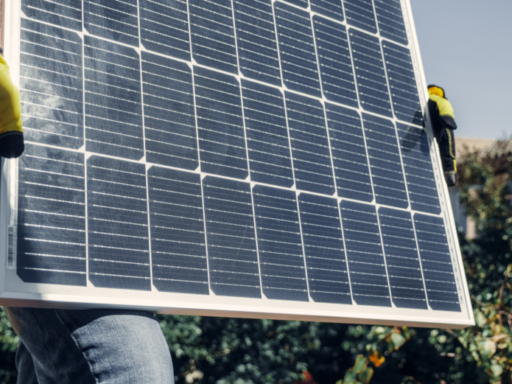Jinko Solar is a major player in the global renewable solar technology landscape. It’s known for its high-performance and efficient solar panels, offered at a competitive cost. Not to mention its global manufacturing network and a track record of consistently breaking world records.
In this review, we’ll cut through the fluff and hype to bring you an in-depth review of Jinko Solar and some of its best solar panels.
Jinko Solar Company Overview
Jinko Solar is an innovative solar technology company founded in December 2006 in Shangrao, Jiangxi, China. Its current headquarters are in Shanghai, but it operates at least 14 manufacturing facilities across Asia and the US. Xiande Li serves as the company’s current chairman and CEO.
Jinko Solar’s official mission statement is “changing the energy portfolio and taking responsibility for enabling a sustainable future.”
The company has achieved significant growth in a short amount of time. It was listed on the New York Stock Exchange in 2010 and opened its first factories abroad in Malaysia in 2015 and the US in 2019.
To date, Jinko Solar claims to have delivered 210 GW in solar systems with 8,000+ annual orders. The company operates 35+ global service centres, has coverage in 190 countries, and employs 46,511 people.
Jinko Solar Products
The current Jinko Solar catalogue is divided into two primary lines of solar panels:
- Tiger Neo series
- Tiger PRO series
However, the company also supports energy solutions that go beyond just solar panels. Through these solutions, Jinko Solar offers a complete solar power ecosystem to support a variety of applications.
This includes a Utility Electric Storage System (ESS) with both industrial and residential battery variations.
What Technology Does Jinko Solar Use in its Solar Panels?
Jinko Solar positions itself as an innovative and disruptive force in the solar industry, and this is reflected in its emphasis on technology.
Half-Cell Technology
One of its cornerstone technologies is its Half Cell module technology. Using half-cells also effectively halves the electrical current flowing through each busbar. This reduces the amount of internal energy loss by 75% compared to a full-sized cell module.
Other benefits include:
- Less energy production loss due to shading
- Up to 3% more power in similar conditions
- Solid thermal management with a lower working temperature
A key component of this is the addition of a passivation layer, which increases power reflection.
Bifacial Cell Module
Another innovative design is its bifacial module with transparent backsheet technology. These solar panels also capture sunlight reflected off the surface behind the panel for extra energy generation.
Jinko Solar claims it can lead to a 20% increase in power gain depending on albedo and PV system design. This technology is ideal for solar panels in areas like a sunroom, desert plant, carport, or alongside highways.
Tiger NEO Series – N-Type Solar Panels
The Tiger NEO series represents the cutting-edge of Jinko Solar solar panels. This line is outfitted with Jinko Solar’s latest N-type TOPcon technology, designed to maximise efficiency and performance.
N-type solar cells utilise negatively charged silicon, having been doped using phosphorus or arsenic. This process results in an excess of electrons, hence making it a negatively charged semiconductor.
The Tiger NEO is a high-powered series with model outputs in the range of 445 Wp to 635 Wp. This series also pushes the boundaries in terms of efficiency, with ratings of up to 23.23%.
Clients in the utility and commercial & industrial (C&I) industries will find that these solar panels cater to their needs with their superior performance. In particular, their minimal efficiency loss under high temperatures makes them ideally suited to demanding conditions.
Monofacial
As indicated by the name, this range of Tiger NEO models emphasises delivering maximum efficiency from one side of the solar panels. These solar panels are thus ideal for rooftop installations or other areas where you can optimise direct sunlight exposure. They are also better suited to residential or smaller commercial installations.
Bifacial
As mentioned, these solar panels also capture energy reflected from the surface behind the panel, thanks to its dual-facing design. For installations in environments with high ground reflectivity or where the solar panels are raised above the service, this offers the opportunity for increased energy yield. Bifacial solar panels are often deployed in large-scale installations, such as those in desert environments.
Full Black
The full black variants of the Tiger Neo series combine aesthetic appeal with high efficiency. The design renders the busbars grid virtually invisible for a sleek, minimal, tiled appearance. This makes them a preferred choice for installations where aesthetics are an important consideration. These solar panels can seamlessly blend in with darker rooftops without compromising performance.
Tiger PRO Series – P-Type Solar Panels
Switching focus to the Tiger Pro series, these p-type solar panels are built for durability and cost-efficiency. This series caters to a market that prioritises long-term reliability at a lower upfront investment. In short, it’s a more affordable alternative to series offering N-type technology.
The “p-type” signifies that the solar cells contain silicon with a positive charge, having been doped with boron. By ensuring that there are more holes than electrons in the silicon, it ensures that the material is more receptive to new electrons.
Performance of the Jinko Solar Solar Panels
Jinko Solar is known for setting performance benchmarks in the industry and continuously improving its solar panels’ performance and efficiency. Its N-type TOPCon technology leads the way in terms of its commercial products, with efficiencies of up to 23.23%.
Jinko Solar also has a pedigree of setting world records regarding performance under laboratory conditions:
Most recently, Jinko Solar had a major breakthrough with its perovskite-silicon stacked tandem N-type TOPCon cells, achieving a conversion efficiency of 32.33%.
What Is the Jinko Solar Warranty?
The exact terms and conditions of your warranty depend on the manufacturing date, series, and exact model of the solar panels. However, most Jinko Solar solar panels manufactured after April 2014 fall under either its 12 or 25-year limited product warranty and 30-year limited power warranty.
Among its guarantees are:
- First-year degradation rate of between 1% and 2.5%.
- Average annual degradation rate of between 0.4% and 0.6%.
- Pmin at the end of the power warranty period of 83.10% to 87.4%.
These warranties are competitive within the P-type solar panel market. Most other suppliers of P-type panels offer 25-year warranties but only guarantee an average Pmin of 80%.
However, it’s important to note that P-type panels, like those offered by Jinko Solar, generally have higher degradation rates than N-type TOPCon panels. N-type TOPCon panels often boast degradation rates as low as 0.25% and Pmin values up to 92%, as seen with manufacturers like SunPower and REC.
How Much Do Jinko Solar Modules Cost?
Jinko Solar’s solar panels are definitely competitively priced compared to most of the market. Its modules typically range in cost from €0.120/Wp to €0.190/Wp, depending on the specific model and underlying technology.
Jinko Solar’s Eagle series is particularly popular as an affordable option with decent performance across the US.
Jinko Solar’s Best Solar Panels
Let’s take a closer look at some of Jinko Solar’s best solar panels and what makes them attractive.
All of the below models come with the following key Jinko Solar product features:
- SMBB Technology – enables better current collection and reduced resistance losses
- Hot 2.0 Technology – improves reliability and performance in high heat conditions
- Enhanced Mechanical Load – withstands heavy snow and wind loads
- PID Resistance – protects against potential-induced degradation
- Durability Against Extreme Environmental Conditions – designed for long-term performance in harsh climates
Tiger Neo Mono 54R HC
| Product code | JKM425-54HL4R-(V) |
| Technology | N-Type |
| Power output | 430-450W |
| Efficiency | Up to 22.27% |
| Warranty | 25-year performance guarantee (87,4%), 12-year product warranty |
| Price | Estimated from €0.134/Wp |
These solar panels are ideal for residential installations. It offers high efficiency and significant power output for home installations without taking up too much space. The full black design gives it an aesthetically pleasing and minimalist design.
Tiger Neo Mono 54R All Black
| Product code | JKM430N-54HL4R-B |
| Technology | N-Type |
| Power output | 425-445W |
| Efficiency | Up to 22.27% |
| Warranty | 25-year performance guarantee (87,4%), 12-year product warranty |
| Price | Estimated from €0.140/Wp |
At only a slightly higher cost, the full black edition caters to residential owners who are willing to pay a bit extra for an aesthetic upgrade. Other than that, it features the same compact design and features as the standard Tiger Neo Mono 54R HC. While not really impactful, it also comes with a slightly lower power output.
Tiger Neo Mono 60 HC
| Product code | JKM470-490N-60HL4-V |
| Technology | N-Type |
| Power output | 470-490W |
| Efficiency | Up to 22.67% |
| Warranty | 30-year linear power warranty (87.4%), 12-year product warranty |
| Price | Estimated from €0.140/Wp |
The 60 HC offers a balance of high power output and efficiency. It’s something of a transition model, equally adept at both high-consumption residential and smaller commercial installations. Like its counterparts, its robust design and durability mean it can stand up to most conditions.
Tiger Neo Bifacial 66 HC Dual Glass
| Product code | JKM600-625N-66HL4M-BDV |
| Technology | N-Type |
| Power output | 600-625W |
| Efficiency | Up to 23.14% |
| Warranty | 30-year linear power warranty (87.4%), 12-year product warranty |
| Price | Estimated from €0.153/Wp |
The 66 HC Dual Glass comes in at one of the higher price points for Jinko Solar solar panels. However, with its bifacial technology, it can capture sunlight from both sides of the solar panels, increasing power generation.
With boosted output and a higher cost, it’s most well-suited for commercial and industrial applications.
Comparison of Jinko Solar Solar Panels Models
Here’s a side-by-side comparison of the above solar panels for your convenience:
| Performance | Warranty | Price | Power | Product code | |
| Jinko Tiger Neo Mono 54R HC | 22.27% | 25-year performance guarantee, 12-year product warranty | Estimated from €0.134/Wp | 430-450W | 54HL4R-(V) |
| Tiger Neo Mono 54R HC All black | 22.27% | 25-year performance guarantee, 12-year product warranty | Estimated from €0.140/Wp | 425-445W | JKM430N-54HL4R-B |
| Tiger Neo Mono 60 HC | 22.67% | 30-year performance guarantee, 12-year product guarantee | Estimated from €0.140/Wp | 470-490W | JKM470-490N-60HL4-V |
| Tiger Neo Bifacial 66 HC Dual Glass | 23.14% | 30-year performance guarantee, 12-year product guarantee | Estimated from €0.153/Wp | 600-625W | JKM600-625N-66HL4M-BDV |
Pros and Cons of Jinko Solar Panels
Pros:
- Jinko Solar controls the entire production process, from silicon ingots to panel assembly, ensuring consistent quality across their products.
- Many of Jinko’s models boast efficiencies of over 22%, making them some of the most efficient panels on the market.
- As a financially robust corporation, Jinko has significant resources to invest in technology and global market expansion.
- Jinko Solar has a widespread distribution and operation network worldwide.
- The company has a strong brand reputation for high standards.
- Jinko Solar’s products are competitively priced, offering good value for the quality and performance they deliver.
Cons:
- Jinko panels have sometimes been used by less reputable solar retailers.
- Despite being a billion-dollar company, Jinko Solar has been rated as “at-risk” financially by some analysts, like SinoVoltaics.
- While many of Jinko’s panels are high-performance, there can be significant variance between different series and models.
Jinko Solar vs. Other Solar Panel Manufacturers
When it comes to what’s commercially available, Jinko Solar represents the “great value for an affordable cost” option. Their solar panels are, on average, priced more affordably than the majority of competitors.
Jinko Solar panels, particularly the Tiger Neo and Tiger Pro series, compare well against their main competitors like LONGi and JaSolar in terms of efficiency and performance.
Jinko’s Tiger Neo series leads with efficiencies up to 23.23% and features high-grade N-Type TOPCon cells. These cells are recognised for their superior performance and low rates of degradation.
In comparison, LONGi’s highest efficiencies touch 23.60%, making it a strong contender. It has a slightly different technological focus, using monocrystalline silicon technology in most of its solar panels. On the other hand, JaSolar has a strong reputation for high efficiency, with its panels often exceeding 24.8%. Not to mention its robust warranties.
Summary – Are Jinko Solar Solar Panels Worth Buying?
In short, Jinko Solar panels are a worthwhile investment if you’re looking for efficient yet cost-effective solar solutions for both residential and commercial installations. With their high-quality manufacturing and some of the industry’s highest efficiency ratings, these panels offer great value.
Despite being a value option, their solar panels are backed up by some impressive tech. The Tiger Neo and Tiger Pro series, equipped with advanced technologies like N-type TOPCon cells and bifacial modules, enhance performance across various applications. This makes Jinko Solar panels a practical choice for virtually anyone, anywhere.
 EN
EN ES
ES DE
DE PL
PL IT
IT FR
FR GR
GR


